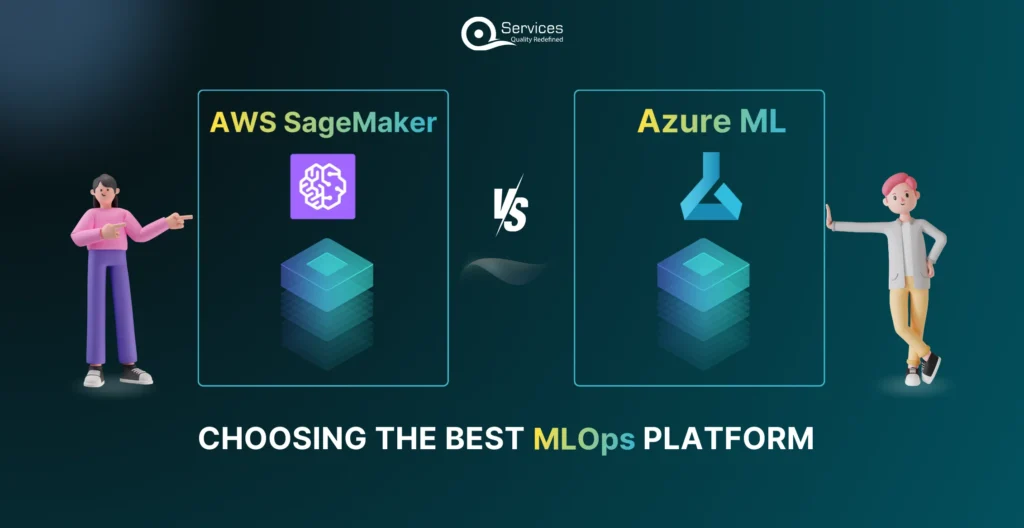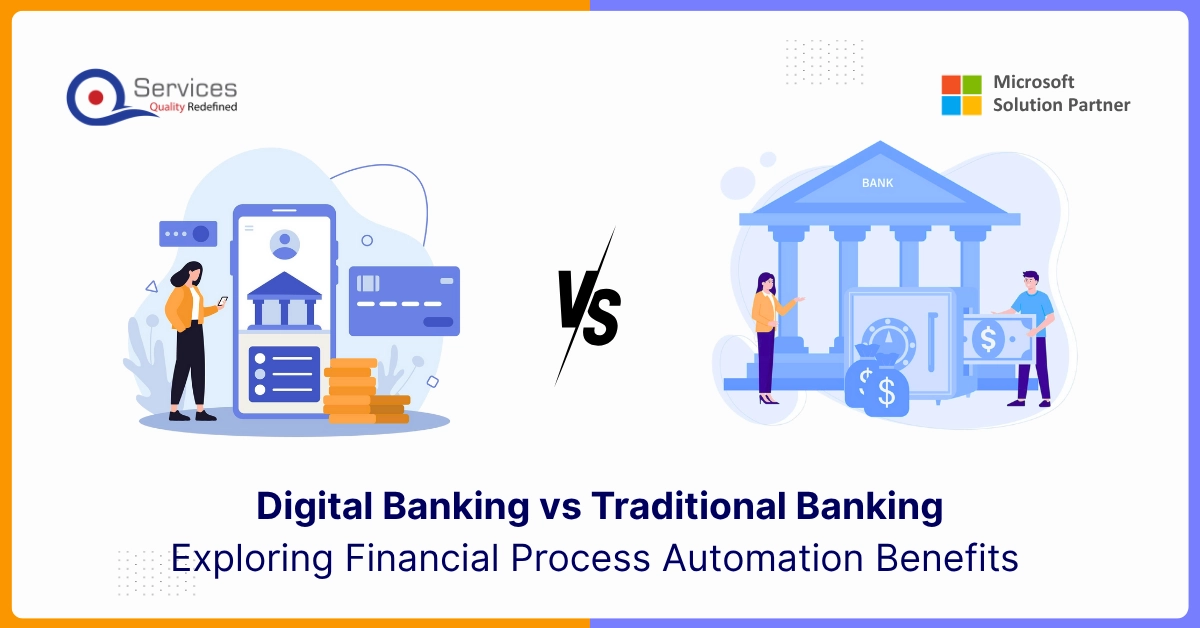
Home » AWS SageMaker vs. Azure ML: Choosing the best MLOps Platform

In an era where organizations are focused on automating processes to maximize efficiency, the importance of MLOps has become clear. MLOps, combining machine learning with continuous development operations, streamlines the lifecycle of ML models from development to deployment. Among the leading platforms, AWS SageMaker and Azure Machine Learning (Azure ML) offer robust solutions, though they differ in features, ease of use, and integration capabilities. This review compares AWS SageMaker and Azure ML, examining their strengths and weaknesses to help businesses decide which platform best meets their needs for aws vs azure machine learning.
A set of procedures known as MLOps (Machine Learning Operations) is intended to optimize the creation, deployment, and monitoring phases of machine learning (ML) models. MLOps’ main goal is to automate several ML process operations, resulting in an effective pipeline that resembles an assembly line. MLOps significantly boosts productivity and decreases the amount of manual labor needed from data scientists and engineers by automating tasks associated with model building, deployment, and maintenance.
MLOps tackles several key challenges in ML development, including:
Resource Intensiveness: ML projects often require substantial computational power and specialized software, making them resource intensive.
Manual Configuration: Data scientists typically spend significant time on manual configuration and maintenance of models, which can be both time-consuming and prone to error.
Team Silos: Data scientists, software engineers, and IT teams often work in isolation, leading to inefficiencies and delays.
Get free Consultation and let us know your project idea to turn into an amazing digital product.
Collaboration: MLOps bridges the gap between data science and software development. It fosters collaboration among different teams.
Automation: MLOps leverages automation, CI/CD (continuous integration and continuous delivery), and machine learning to streamline ML systems’ deployment and maintenance.
MLOps establishes a defined and scalable process, ensuring consistency, reproducibility, and governance throughout the ML lifecycle. It helps organizations manage ML models effectively, enabling continuous improvement and deeper insights.
Amazon SageMaker is a comprehensive, fully managed service designed to streamline the machine learning (ML) workflow for data scientists and developers. It provides an intuitive user interface (UI) for running ML workflows, enabling users to build, train, and deploy machine learning models efficiently. By offering a variety of integrated development environments (IDEs), SageMaker makes its powerful ML tools accessible and user-friendly across different platforms.
Notebooks: Notebooks SageMaker provides managed Jupyter notebooks pre-configured with necessary dependencies, facilitating easy experimentation and development in a collaborative environment.
Training: Training The platform offers robust training capabilities with built-in algorithms or custom code, managing infrastructure automatically for scalable, distributed training.
Hosting: Hosting SageMaker simplifies model deployment by providing hosting services for real-time inference or batch processing, ensuring scalability and high availability.
Azure ML, or Azure Machine Learning, is a cloud service that expedites and oversees machine learning projects from beginning to conclusion. It offers a robust platform to train models, deploy them, and manage MLOps, making it ideal for ML professionals, data scientists, engineers, and app developers. Using PyTorch, TensorFlow, and scikit-learn, among other tools, you can build models directly with Azure ML and integrate them with Microsoft Azure services.
Data Scientists and ML Engineers: Azure ML provides tools to automate and accelerate workflows, enhancing productivity and efficiency in developing and deploying ML models.
Application Developers: Azure ML provides tools to automate and accelerate workflows, enhancing productivity and efficiency in Azure development by developing and deploying ML models.
Platform Developers: Azure ML supports the development of advanced ML tooling using Azure Resource Manager APIs, allowing for the creation of customized ML solutions.
Enterprises: Organizations benefit from Azure’s robust security features and role-based access control, ensuring that ML models and data are managed securely within the Azure cloud environment.
Both AWS SageMaker and Azure ML offer robust development environments, efficient model training and deployment options, and seamless data integration capabilities for aws ml vs azure ml. Here are some key components to compare them:
SageMaker offers Jupyter Notebook instances for interactive development and experimentation.
A fully integrated IDE for building, training, and deploying ML models.
A web-based IDE for creating, managing, and deploying ML models.
Collaborative Jupyter notebooks hosted in the cloud.
SageMaker supports distributed training across multiple instances for faster model training.
Automatically tunes hyperparameters for better model performance.
Deploy trained models as endpoints for real-time inference.
Azure ML offers automated machine learning for model selection and hyperparameter tuning.
Create end-to-end ML pipelines for data preparation, training, and deployment
Deploy models for both real-time and batch predictions.
Easily connect to data stored in Amazon S3 or other AWS services.
SageMaker can access data from Amazon RDS, Redshift, and other databases.
Seamlessly work with data stored in Azure Data Lake Storage.
Access and analyze data using Azure Synapse Analytics.
Both AWS SageMaker and Azure ML are designed to scale effectively within their respective cloud environments.
Remember to evaluate your specific requirements, existing cloud infrastructure, and team expertise when choosing between these platforms.
Healthcare and Life Sciences: SageMaker is instrumental in medical image analysis, disease prediction, and recommending personalized treatments, improving patient outcomes and operational efficiency in healthcare.
Retail and E-Commerce: Retailers leverage SageMaker for accurate demand forecasting, optimizing inventory, and providing personalized product recommendations, enhancing customer satisfaction and boosting sales.
Financial Services: SageMaker supports financial institutions with fraud detection, credit risk assessment, and algorithmic trading, ensuring higher accuracy and operational efficiency in financial operations.
Manufacturing and Supply Chain: Manufacturers utilize SageMaker for predictive maintenance, quality control, and optimizing supply chain operations, reducing downtime and enhancing production efficiency.
Real-Time AI Applications: Azure ML excels in developing real-time analytics, chatbots, and recommendation engines, benefiting industries like retail and customer service by improving responsiveness and customer engagement.
Sentiment Analysis and Customer Insights: Azure ML enables businesses to analyze customer sentiment from various sources, such as social media, reviews, and surveys, enabling targeted marketing efforts and personalized customer experiences.
Fraud Detection and Anomaly Detection: Azure ML empowers financial institutions to prevent fraud, identify unusual patterns, and mitigate risks effectively, strengthening security measures and safeguarding customer assets.
Churn Prediction and Customer Retention: Azure ML supports industries such as telecommunications and subscription services, as an Azure managed service provider, in predicting customer churn and implementing strategies to enhance customer retention.

AWS SageMaker and Azure Machine Learning (Azure ML) are prominent MLOps platforms, each offering robust capabilities tailored to diverse business needs. AWS SageMaker, part of AWS, excels in automating the machine learning lifecycle with tools like SageMaker Ground Truth and Data Wrangler for data prep, and supports advanced features such as hyperparameter tuning. It requires coding expertise and uses CloudWatch for logging, suitable for teams needing comprehensive, technically advanced solutions.
Azure ML, hosted on Azure, emphasizes user-friendly interfaces and drag-and-drop functionalities, making it accessible for teams without deep coding knowledge. It supports AutoML, hyperparameter tuning, and integrates well with Azure services like Azure Synapse for data prep. Azure ML uses MLFlow for detailed artifact logging, offering better documentation and support compared to AWS SageMaker. It’s ideal for businesses prioritizing ease of use and broad algorithm support.
In summary, AWS SageMaker suits teams with technical proficiency seeking comprehensive ML workflows, while Azure ML appeals to businesses looking for simplicity, robust support, and flexible deployment options in the context of Azure ML vs AWS SageMaker. The choice depends on specific business requirements, user experience preferences, and existing infrastructure.
As innovation and AI technology continue to advance, the future of fintech looks bright. By prioritizing personalized customer experiences and improving operational efficiency, financial institutions can drive growth, build customer loyalty, and create a more inclusive financial ecosystem. Embracing the potential of AI is essential for staying ahead in this dynamic industry and transforming how we interact with financial services.

Our Articles are a precise collection of research and work done throughout our projects as well as our expert Foresight for the upcoming Changes in the IT Industry. We are a premier software and mobile application development firm, catering specifically to small and medium-sized businesses (SMBs). As a Microsoft Certified company, we offer a suite of services encompassing Software and Mobile Application Development, Microsoft Azure, Dynamics 365 CRM, and Microsoft PowerAutomate. Our team, comprising 90 skilled professionals, is dedicated to driving digital and app innovation, ensuring our clients receive top-tier, tailor-made solutions that align with their unique business needs.

Automation is quickly becoming a major driver of growth in the finance sector. The way it manages rising transaction volumes, complex compliance needs, and other critical processes has caught the attention of many financial institutions.

Most emerging banks are struggling to handle more customers, increasing financial data, and growing regulatory demands. They now need to move beyond traditional methods and adopt faster, more scalable solutions.

At the heart of this change are technologies like AI, cloud computing, and automation. And when you collaborate with Microsoft Solution Partners, you can ride this wave of transformation.
Both platforms provide scalable and flexible machine learning solutions, with familiar tools and frameworks. Azure has an advantage for integrating with Microsoft’s developer ecosystem and tools like Visual Studio, while AWS is known for its extensive suite of cloud services and strong customer support.
Sagemaker makes use of the Search API and Azure makes use of the ML Flow API to pick and choose the best experiments. The Model Metrics can be customized in both of these environments.
Azure has a better SDK (Standard Development Kit) as compared to AWS.
Besides the benefits of PaaS, Azure has a built-in mechanism that makes VMs easy to scale so operating costs are lower than AWS.

Founder and CEO

Chief Sales Officer
